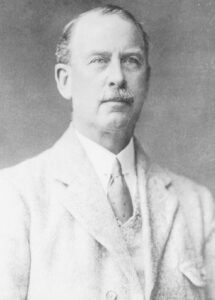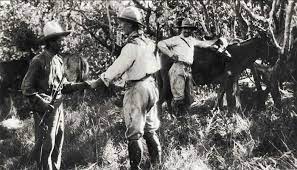Colonel Percy Fawcett
 Colonel Percy Harrison Fawcett was a British archeologist and explorer. He was born in 1867 in Torquay, England. He is presumed to have died in 1925 when, along with his son and a family friend, he disappeared while on an expedition to find a legendary city lost in the uncharted regions of the Mato Grosso in Brazil.
Colonel Percy Harrison Fawcett was a British archeologist and explorer. He was born in 1867 in Torquay, England. He is presumed to have died in 1925 when, along with his son and a family friend, he disappeared while on an expedition to find a legendary city lost in the uncharted regions of the Mato Grosso in Brazil.
At the time of his death, Col. Fawcett was an accomplished surveyor. He first traveled to South America in 1906 at the request of the Royal Geographical Society, in order to map the jungle areas bordering Brazil and Bolivia. Between the years 1906 and 1924 he made seven expeditions to this region.
Fawcett was a personal friend of the British authors H. Rider Haggard and Arthur Conan Doyle of Sherlock Holmes fame. It was said that it was Fawcett’s stories that were the inspiration for Doyle’s book “The Lost World”, and that his example as an adventurer and archaeologist later became the template for the screen character of Indiana Jones.
Fawcett had a passion for uncovering the mysteries of antiquity, and it was during his many expeditions to the jungle that he began to hear stories, told to him by the local Indians, of a lost city located somewhere in the Mato Grosso region of Brazil. The quest to discover this legendary city became the overwhelming obsession of his life. As he wrote in a letter to his son Brian:
“I expect the ruins to be monolithic in character, more ancient than the oldest Egyptian discoveries. Judging by inscriptions found in many parts of Brazil, the inhabitants used an alphabetical writing allied to many ancient European and Asian scripts. There are rumors, too, of a strange source of light in the buildings, a phenomenon that filled with terror the Indians who claimed to have seen it.”
“The central place I call “Z” — our main objective — is in a valley surmounted by lofty mountains. The valley is about ten miles wide, and the city is on an eminence in the middle of it, approached by a barrelled roadway of stone. The houses are low and windowless, and there is a pyramidal temple.”
 The lure of discovering this legendary city which he called “Z” became a siren song for Fawcett, as it had done for so many adventurers before him, as well as others who were drawn to that area after his death.
The lure of discovering this legendary city which he called “Z” became a siren song for Fawcett, as it had done for so many adventurers before him, as well as others who were drawn to that area after his death.
Yet this legendary city has remained tantalizingly out of reach, for there is no record that Fawcett, or anyone else, has ever returned to describe the place that has fired the imaginations of so many, as may be seen from the image shown here.
In 1925 Fawcett, together with his elder son Jack and his friend Raleigh Rimmell, set out to discover the lost city of gold. Fawcett always preferred to travel light, with companions who could be relied upon to negotiate the dangers that confronted them. Small groups of people were also less likely to attract the attention of hostile Indian tribes.
On May 29th, 1925, Fawcett telegraphed his wife saying that they were ready to enter unexplored territory in the region of the Upper Xingu, a tributary of the Amazon River. He said that they had sent the rest of the party back on account of the dangers posed by the local Indians, and that just the three of them would be going on. His message ended with the words; “You need have no fear of failure.”
This was the last that anyone heard of the expedition. The three men vanished into the jungle and w ere never heard from again.
ere never heard from again.
No sooner had the group disappeared than rumors of their fate began to circulate. Some thought they had met their death at the hands of the Indians, while others were convinced they had died of disease or fallen prey to wild animals.
Percy Fawcett’s son Brian made two trips to the area to try to solve the mystery of their disappearance, but returned without success. But stories of a lost city of antiquity hidden deep in the jungles of the Mato Grosso continue to persist, and in the decades that have followed, more than a hundred people have lost their lives in their quest to find this lost city of Paititi.
Yet the haunting thought remains. Could Percy Fawcett actually have succeeded in finding his city of “Z” after all, but was prevented from leaving by the local Indians who guarded the site? Up to the time of her death, Fawcett’s wife remained convinced that her husband had achieved his goal, and had lived for many years in the city of his dreams.
Perhaps we shall never know, for the existence of this lost city has until now remained hidden in the mists that shroud the jungles of the Mato Grosso. These jungles guard their secrets well, for as the Oracle of Tolemac has written:
“Until that time when the world is ready to rediscover the lost science of Paititi their secrets will remain protected by the jungle, poisonous reptiles and hostile Indian tribes, who are the modern guardians of this ancient knowledge.”
The world might have forgotten about the hoary legends of Paititi if it had not been for the tales of a Swiss hotelier who visited South America in 1972, and met with a reclusive man with a sensational story to tell. The name of the Swiss writer was Erich von Däniken, and the man that he met was Juan Moricz.
At the time of their meeting Erich von Däniken was a successful author with a provocative theme. He had already published two books which had captured the popular imagination of the world and become instant best-sellers. These books were “Chariots of the Gods” and “Return to the Stars”.
While most scholars and scientists scorned his theories of “ancient astronauts”, von Däniken was nevertheless successful in drawing the attention of the world to ancient relics and ruins that defied the traditional explanation of the history of humanity. In his book entitled “The Gold of the Gods”, von Däniken described why he had arranged to meet with Moricz.




